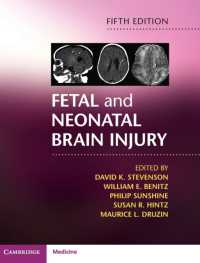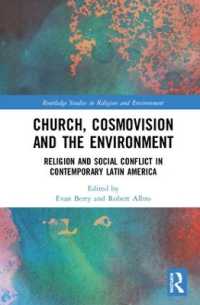Full Description
New Testament Theology in a Secular World is an important and original new work in Christian apologetics. It is the first book to apply constructivist theory to biblical studies.
Biblical Studies scholar Peter Lampe tackles head on such questions as: What do we understand by "reality?" How does this relate to what theology calls the "reality of God" or the "reality of resurrection?" How can we account for the concept of "revelation"? Lampe argues that in talking about "reality" theologians must make an effort to engage with the concept of "reality" as it is discussed in the fields of philosophical epistemology and sociology of knowledge. However, as Lampe shows, Theology has so far hardly or only reluctantly participated in this dialogue.
Contents
I. Introduction—Indicating the Problem
II. Stages in the History of Thought on the Way to Constructivism
1. Between Naïve Realism and Ontological Idealism
1.1 Epistemological Idealism
1.2 Epistemological Realism
1.3 Problems of Representation Theories, Ontological Idealism
1.4 Linking Ontological Realism and Epistemological Idealism
1.5 Further Problems of Realism's Correspondence Theory
1.6 The Collapse of Logical Empiricism
2. On the Concept of Truth
2.1 Ontic Truth
2.2 Truth as Object-Subject Correspondence
2.3 Subjective Truth
2.3.1 Truth Immanent in Language, Propositional Logic
2.3.1.1 Coherence
2.3.2 The Linguistic-Pragmatic Concept of Truth
2.3.3 The Pragmatic Concept of Truth
2.4 Parallel Moves toward the Subjective
III. The Brain as a Designer
1. Neurophysiological Arguments for Constructivism
2. Does an External Ontic Reality Exist?
3. The "Other," the "Self," and the Freedom of the Will as Reality Constructed by the Brain?
4. Gaps between Scientific and Everyday-Knowledge Constructs of Reality
IV. Objectivity as Intersubjectivity—The Interface with Sociology of Knowledge
V. A Constructivist Sociology of Knowledge Model
VI. Implications for Theological Discussion
1. On the non-Absolute Character of Theological Speech
2. Human Interaction with a Cognitive Model of God?
3. Ontological Equality of Diverse Constructs of Reality as a Prerequisite of Intercontextual Dialogue and Competition
VII. Application of the Model to Early Christian Examples—The New Reality of the Early Christians.
1. The Resurrection of Jesus
1.1 The Axiom of the Early Christian Context
1.2 Presettings
1.3 The Axiomatic Laying of a Foundation
1.4 Immediate Organizational Implications
1.5 The Wider Development of the Axiomatically Founded Context
1.6 An Argument within the Discipline of History?
2. The Irrelevance of Worldly Distinctions
2.1 The New Context of Galatians 3:28 as Intersubjective Shared Reality
2.2 Commuters between Two Contexts
2.3 A Defiant Escape from the Two Worlds: The Revelation of John
2.4 Irenic Rapprochement of the Two Contexts
3. The "New Creation" of the Human Being
3.1 An Ontological Proposition?
3.2 Evidence through Cognitive Construction (Baptism)
3.3 Evidence through Experience (Baptism, Experiences of the Spirit)
3.4 Evidence through Repeated, Institutionalized Experience (Worship, Eucharist)
3.5 Evidence through Experience that Grasps All Participants of a Context and through the Resultant Social Confirmation
3.6 Evidence through Emotional Experience
4. The Eucharist
4.1 Chains of Cognitive Constructions
4.2 All Sources of Evidence
5. New Orientation of Behavior
5.1 The Indicative of the Constructed Reality and the Imperative
5.2 Constructed Reality in Performative and Descriptive Modes of Speech
5.3 The Ethos Resulting from Paul's Theology of the Cross
6. A Swing Back— Jesus of Nazareth's Proclamation of the Kingdom in Word and Deed
6.1 Jesus' Reality of God
6.2 Sources of Evidence
6.2.1 Sensory Perception and Emotional Experience
6.2.2 Social Confirmation
6.2.3 Cognitive Construction as a Result of Hearing the Parables
6.2.3.1 The Basileia of God in the Tradition before Jesus
6.2.3.2 The Parable of the Leaven as a Case in Point
7. Prospects
7.1 Consequences for the Historiography of Theology
7.2 Hermeneutical Consequences
7.3 A Final Note on the Concept of Revelation
VIII. Rather than ens intellectui concordat only intellectus intellectui concordat? A Normative Sketch on the Concept of Reality and on Intercontextual Competition in a Pluralistic Society.
IX. The Prospect for a Constructivist Theory of Historiography
X. Appendix to VII.1.2: Life after Death in Selected Texts in Ancient Judaism
XI. Selected Bibliography
XII. Index
1. Index of Subjects and Persons
2. Index of References








